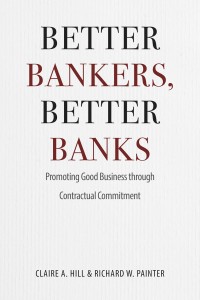On personal liability: Better Bankers, Better Banks in the NYT

A recent New York Times piece on the necessary culpability of bankers in bank misconduct builds on interviews with Claire A. Hill and Richard W. Painter, the authors of Better Bankers, Better Banks: Promoting Good Business through Contractual Commitment, which argues that it’s the bankers’ ability to hide behind their banks to dodge any personal stakes in the hefty fines, penalties, and legal fees levied by the government in the wake of the financial crisis of 2008, or any forthcoming. And Hill and Painter have a plan for how to change that—make bankers personally liable. Here’s a bit from the NYT:
A different proposal comes in a new book by Claire A. Hill and Richard W. Painter, professors at the University of Minnesota Law School. In “Better Bankers, Better Banks,” they argue for making financial executives personally liable for a portion of any fines and fraud-based judgments a bank enters into, including legal settlements.
The professors call this covenant banking. And it looks a lot like the kind of personal liability that was a fact of life among the top Wall Street firms when they were private partnerships.
With their own money at risk, partners of Salomon Brothers, Lehman Brothers and Goldman Sachs were much more careful about their business dealings. When these firms became public companies funded more by outsiders’ money, that self-discipline diminished.
“In the old days, because a partnership paid the fine, it would all come out of the partners’ pockets,” Mr. Painter said in an interview. “We’re not going to roll back the clock, but what we can do is come up with a contractual agreement in the compensation package that mimics some of that structure.”
Their plan contains a crucial element, requiring the best-paid bankers in the company to be liable for a fine whether or not they were directly involved in the activities that generated it. Such a no-fault program, the professors argued, would motivate bankers not only to curb their own problematic tendencies but to be on the alert for colleagues’ misbehavior as well.
This would help instill a culture, the law professors wrote, “that discourages bad behavior and its underlying ethos, the competitive pursuit of narrow material gain.”
Putting such a covenant in place would also help eliminate the problem of banking regulators who become captured by the institutions they are supposed to police. “Those in the best position to choose conduct that is appropriate may not be regulators but, rather, bankers with a stake in the bank,” the professors wrote.
. . . . “We don’t take the position that this should only be about banks,” she said. “But banks can do huge damage, and we have seen this ethos in the industry that cries out for responsibility.”
To read more about Better Bankers, Better Banks, click here.